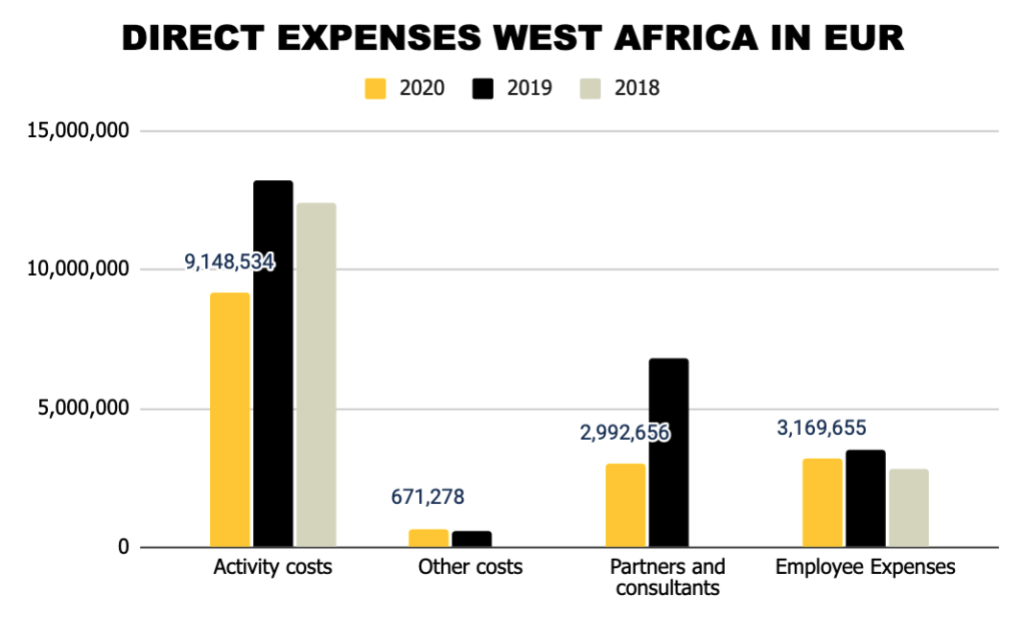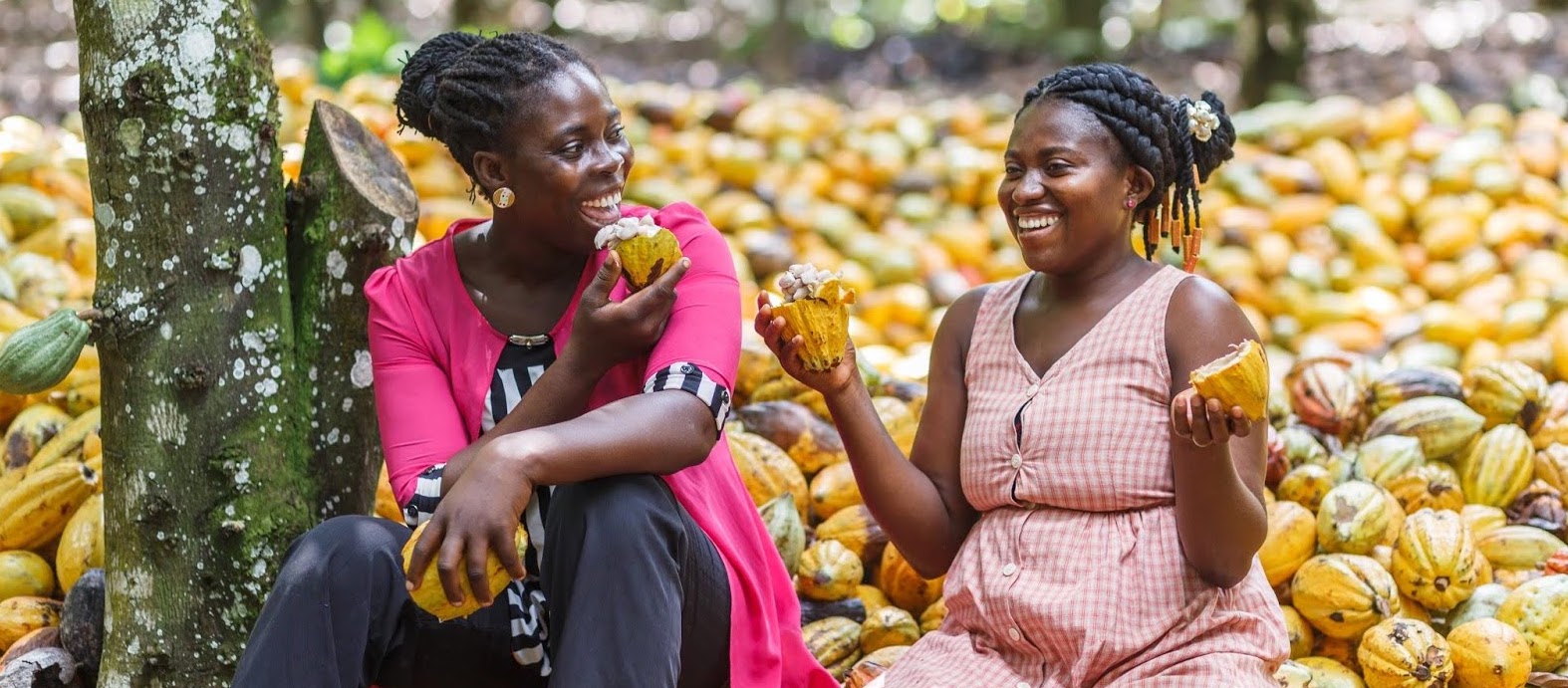Highlights
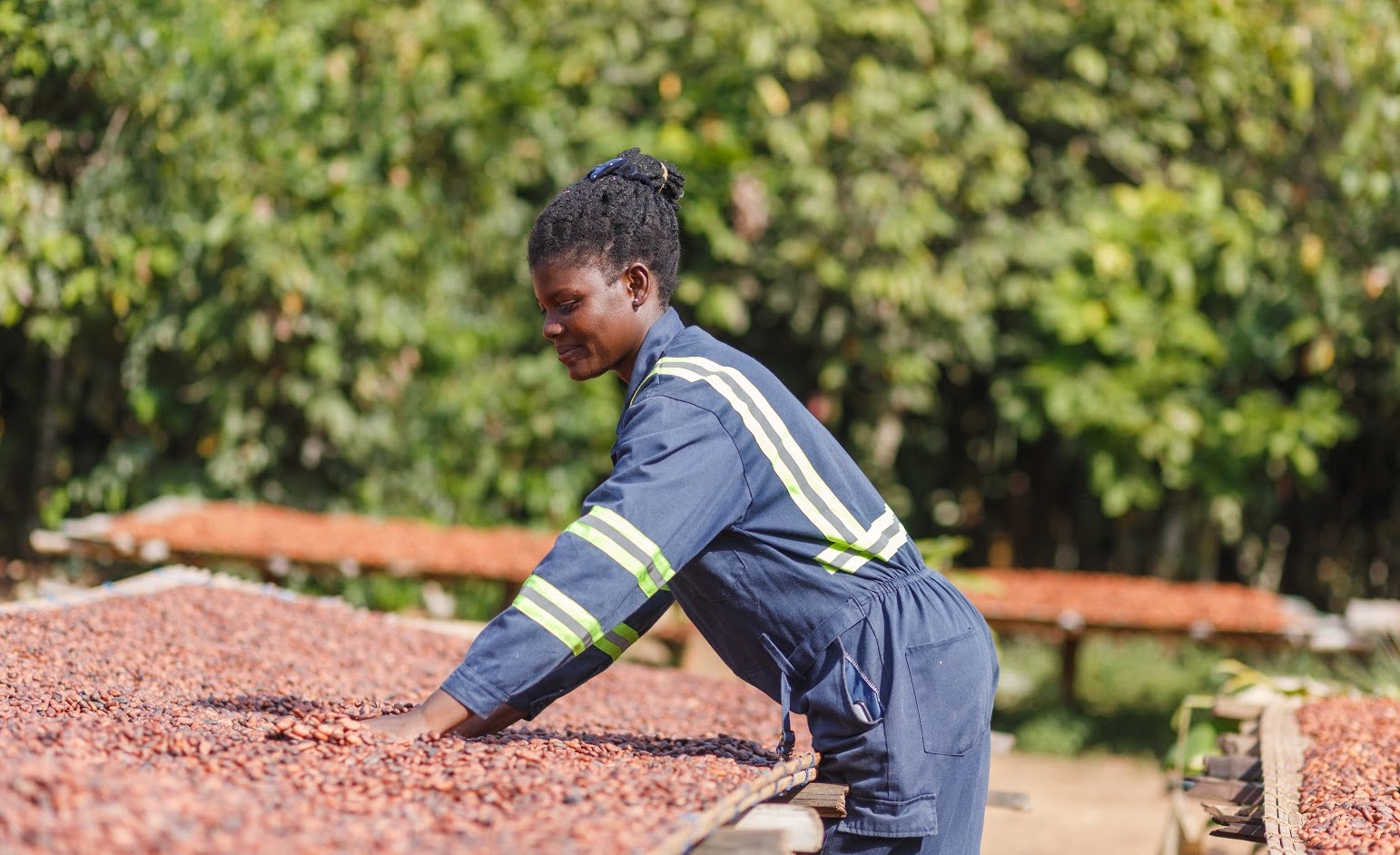
Cocoa
Solidaridad reached 58,491 cocoa farmers with good agricultural practices and crop diversification approaches for income and livelihoods resilience. Forty-seven percent of them reported an increase in yield and income after improving their practices. Additionally, old and unproductive cocoa farms were rehabilitated using high-yielding hybrid seedlings integrated with shade trees for ecosystem enhancement.
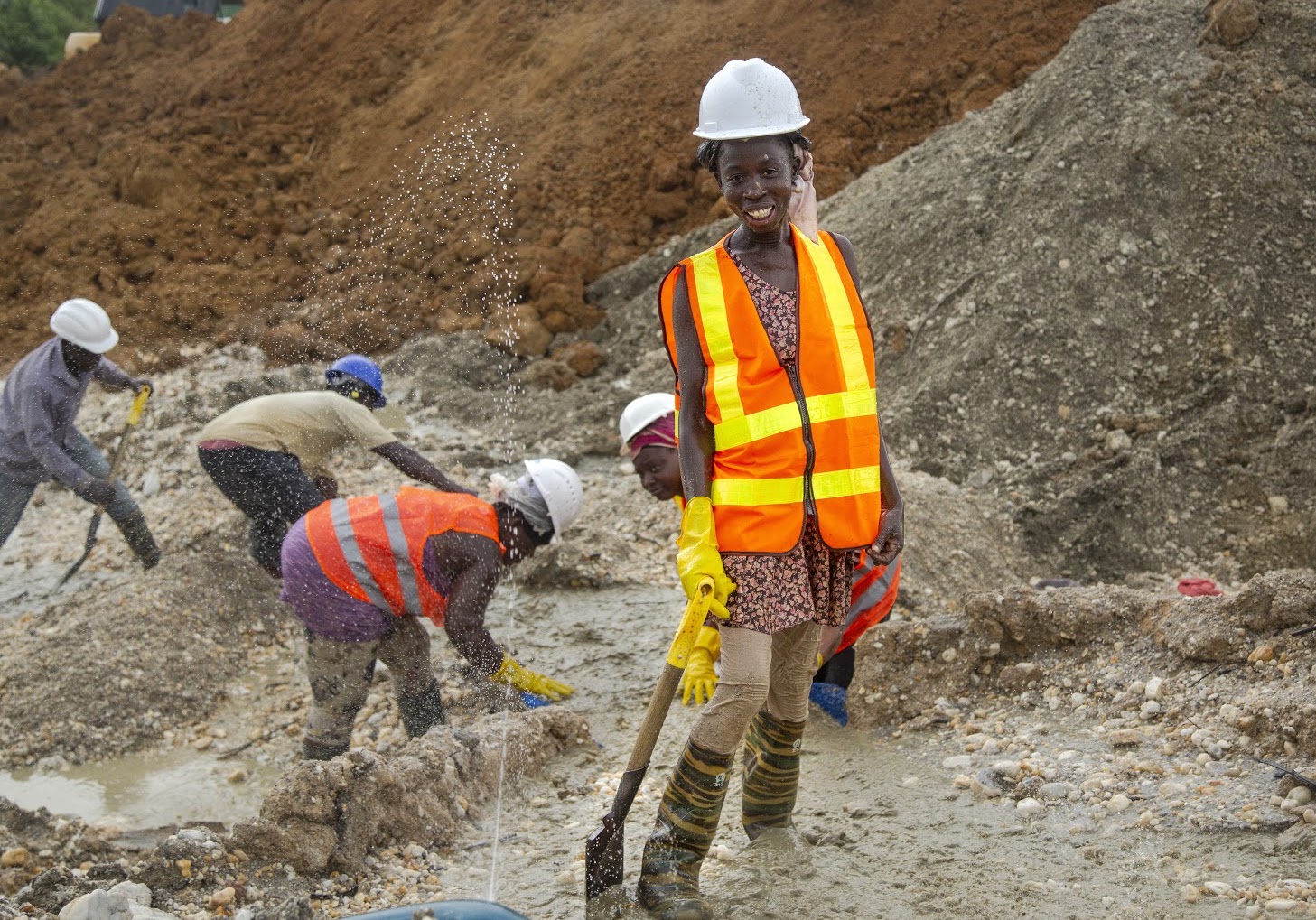
Gold
Practical guidelines on responsible mining practices were deployed to 4,000 artisanal and small-scale miners via a digital tool – the Interactive Voice Response platform. Ten mines produced 109 kg of responsible gold while 118 women received training in occupational health and safety, environmental protection and responsible use of mercury; these contributed to addressing negative externalities associated with small-scale mining.
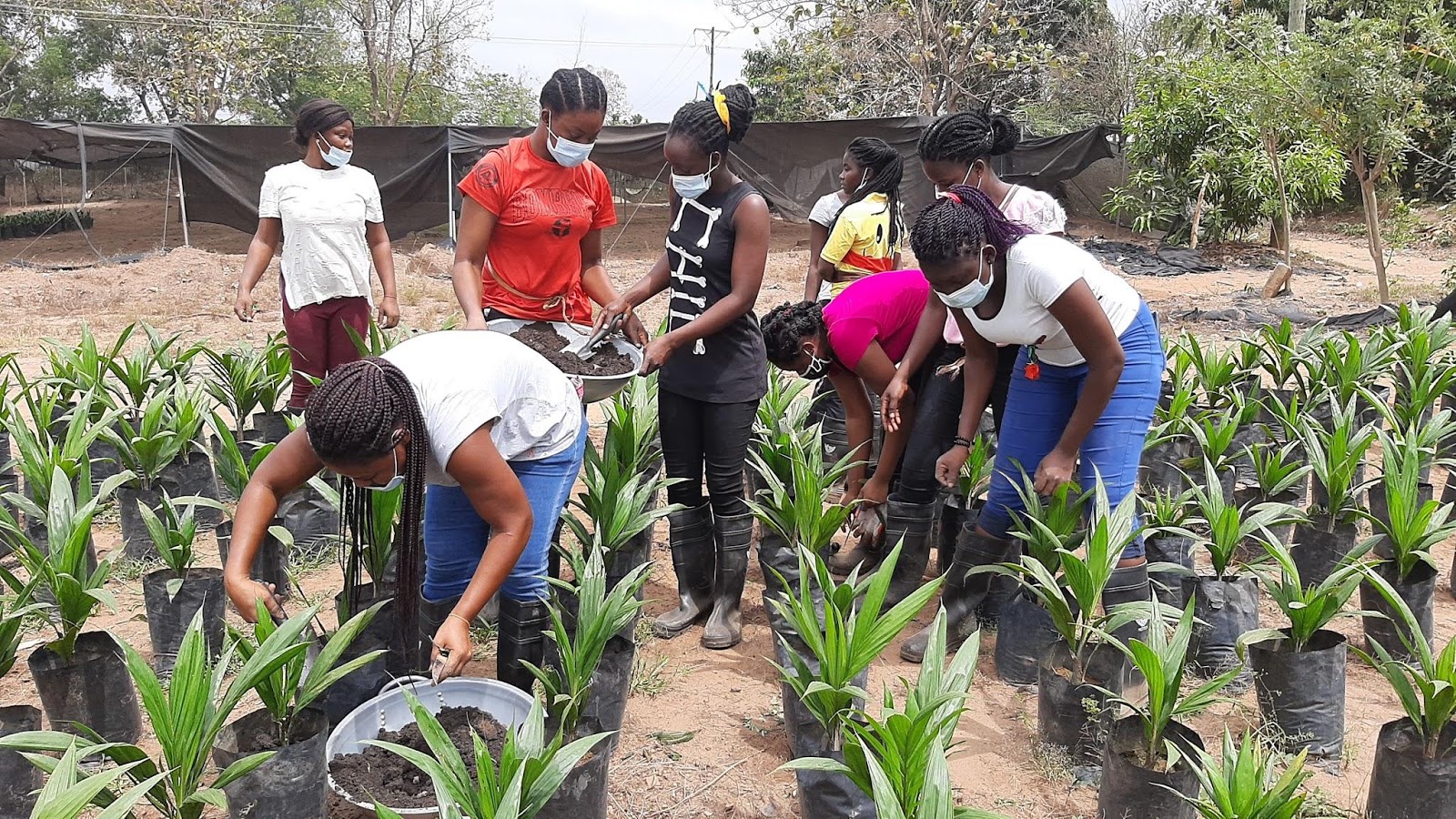
Palm
Over 12,400 trained oil palm farmers are applying best management practices on 26,996 ha of farmland. In Liberia, the average weight of fresh fruit bunches increased from 8.66 kg to 10.77 kg while yield increased from 1.17 tons/ha/yr to 9.27 tons/ha/yr. In Sierra Leone, 7,424 smallholder farmers have been identified for RSPO certification.
Results

54,000
Farmers, miners and workers get services from strengthened providers

146,000
Hectares under sustainable management

66,000
Farmers, miners or workers trained to adopt good practices
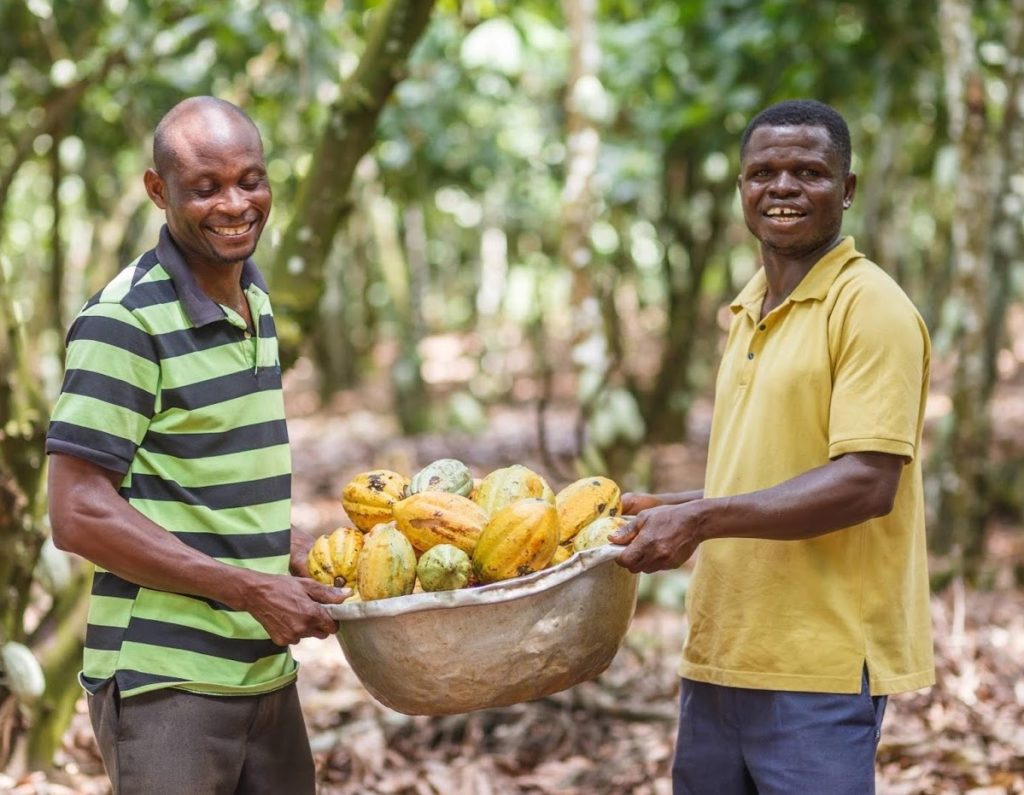
A deep dive
A holistic approach
In 2020, we continued our efforts to increase uptake of good agricultural practices, while also prioritizing the ambitions and livelihoods goals of smallholder farmers and miners. We worked across value chains to create locally appropriate and robust solutions.
In West Africa, Solidaridad trained 95,011 farmers, miners and workers to improve their production practices. More than 59,000 trained farmers are now producing sustainably on 90,314 ha of land.
In Sierra Leone, this included 18,200 cocoa and cashew farmers (45% were women and youth) who incorporated climate-smart agricultural practices into their production systems. In Ghana, 9,563 youth benefited from support to take up cocoa farming as a viable career or livelihood; 72% of these are implementing good agronomic practices on 8,335 ha of land.
A total of 16,647 oil palm farmers and processors were trained in best management practices and food safety to improve the production of palm oil.
More than 1,800,000 cocoa, oil palm, cashew and other economic tree seedlings were raised and distributed in 2020. In Sierra Leone, this included 1,281,753 hybrid cocoa seedlings that were transplanted onto 4,292 ha of new and rehabilitated cocoa farms. In Côte d’Ivoire, this included 35,000 tree seedlings distributed for agroforestry and reforestation purposes, as well as 181,698 seedlings raised in Ghana to support community and individual initiatives.
Two women groups were supported to identify opportunities within the artisanal small-scale mining value chain. The groups are currently improving their livelihoods by providing mine pit maintenance, ore haulage and catering services to mining entities within local communities. Seven out of ten project mines are operating in line with the CRAFT Code requirements. Traceability systems have been set up in project mines to confirm the volume of responsibly produced gold from each mine.
Solidaridad West Africa set up 29 new SMEs and continued its support for 193 existing ones to make them profitable and investment-ready. The SMEs provided agro input and farm management services to over 59,000 cocoa and oil palm farmers. In Côte d’Ivoire, five SMEs accessed 285,842 euros from three financial institutions to scale up their service delivery. In Liberia, the successes from the SME service delivery approach led eight private sector companies to co-invest in 30 SMEs. This has created employment opportunities for 16 youth groups.
To enhance rural farmers’ access to finance, Solidaridad built the capacity of local communities in financial literacy and constituted them into 990 new Village Savings and Loan Associations (VSLA). About 1,530 existing VSLA groups comprising over 58,000 members (46% females) received additional support. Across the region, 2,520 VSLA groups mobilized 696,178 euros to invest in oil palm and cocoa production, as well as other alternative livelihoods.
When governments imposed restrictions on physical movement at the peak of the COVID-19 pandemic, over 77,000 farmers and miners received production support, technical information and training through electronic means using Solidaridad’s established Interactive Voice Response (IVR) platform. Disseminated in various local languages across the five operational countries, the digital tool also enabled Solidaridad to sensitize beneficiaries on COVID-19 safety protocols.
Across the region, SWA convened and participated in 13 multi-stakeholder platforms, and contributed to the development of six policy proposals to relevant public and private decision-makers. In Côte d’Ivoire, Solidaridad advocated for the inclusion of women and youth in leadership positions of organizations and institutions managing the oil palm sector, as well as facilitating their access to farmland. As a result, a government initiative that promotes inclusivity in the artisanal oil palm sector in Cote d’Ivoire has been set up for implementation.
Similarly, traditional laws have been amended to favour women’s access to land for oil palm production in a community in the Cross River state of Nigeria. As a result of our advocacy effort, the ministries of agriculture in four states made plans and budgetary commitments to support the development of the oil palm sector in Nigeria.
In Ghana, Solidaridad, through multi-stakeholder dialogue that involved the Ministry of Lands and Natural Resources and the Minerals Commission, streamlined the Artisanal and Small-scale Mining license acquisition procedures, which originally contributed to illegal ASM operations.
Most Significant Changes
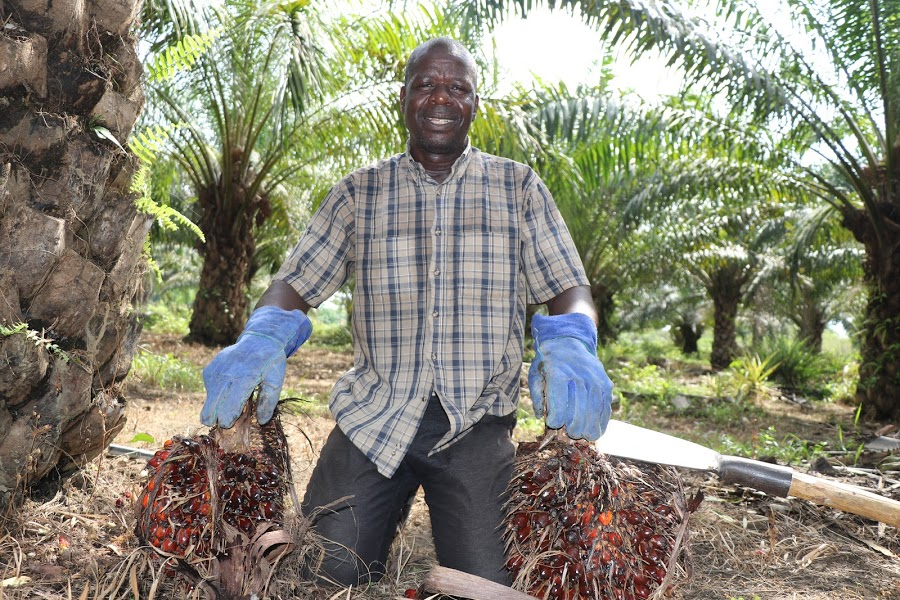
Integrating good practices in smallholder farm management
In West Africa, Solidaridad’s work has been focusing on empowering smallholders to apply innovative solutions that improve their livelihoods while becoming better stewards of natural resources and the environment.
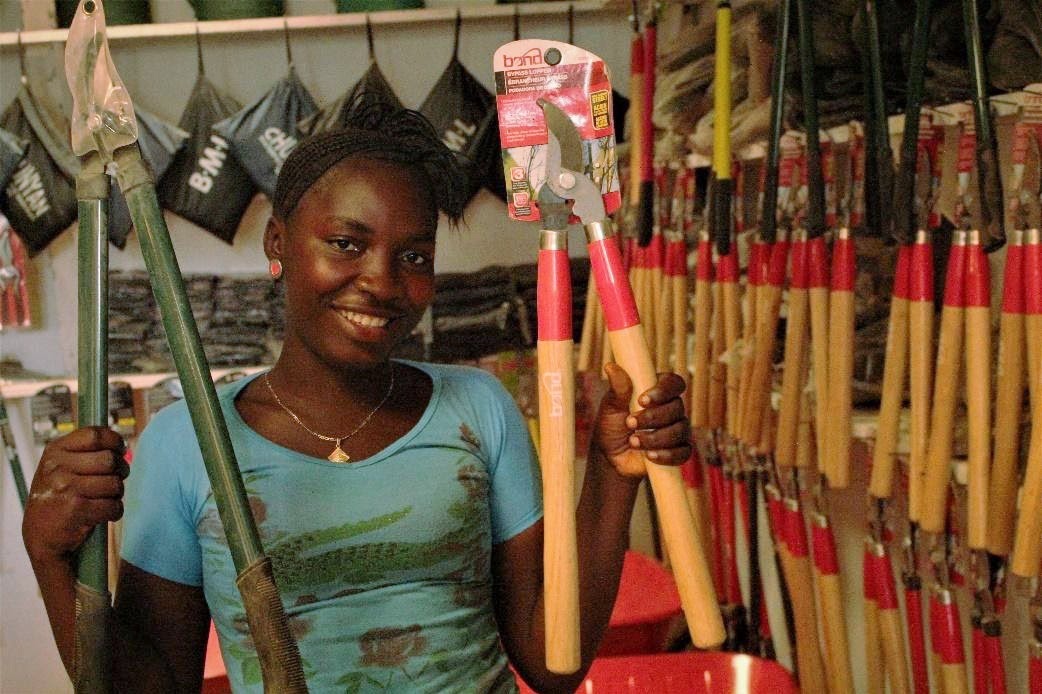
Service delivery SMEs boost production in West Africa
Over the last five years, Solidaridad West Africa has supported the establishment of small and medium enterprises (SMEs) to deliver services that address poor farm management, high costs of labour and inputs, as well as inadequate financial and agricultural extension services in cocoa production.
Innovation Areas
Insights
Making strides
Within each innovation area, we focused on applying tools based on farmers’ and miners’ real needs and priorities. We also integrated the approaches to maximize impact, sharing learnings across gender, digital and beyond.
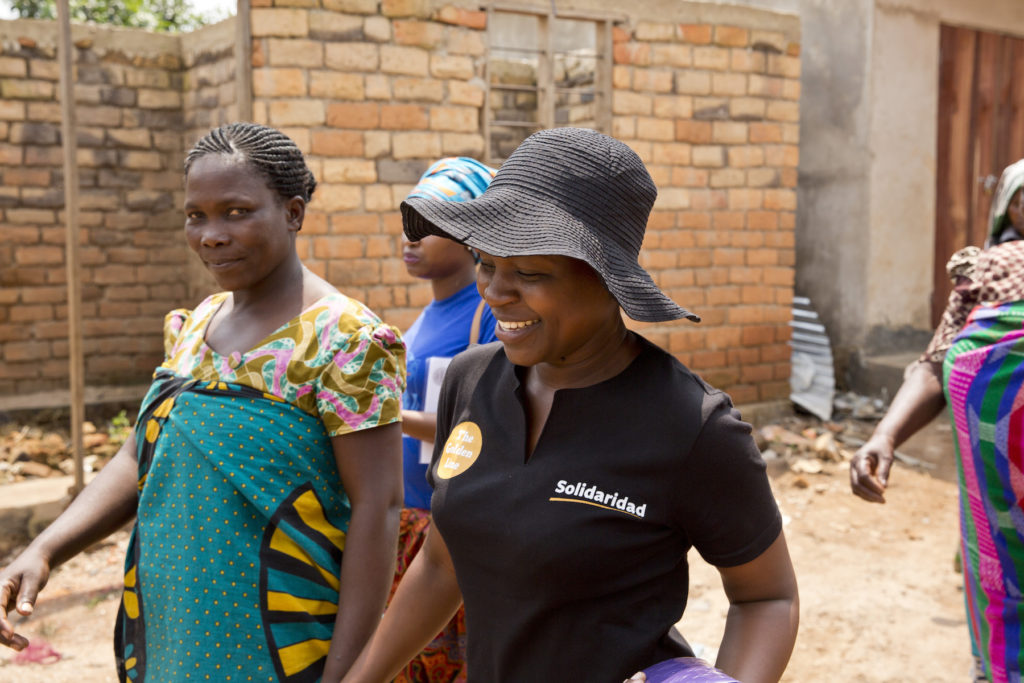
In 2020, the REC participated in studies to test Solidaridad’s three-tier business case, contributed to country and commodity gender profiles and provided context-specific inputs for gender strategies and policies.
SWA developed and implemented strategies to promote active participation of both women and men in all of its interventions, ensuring inclusive access to project resources including skills training, technology transfer, and input credit. The gender inclusivity strategy ensured that barriers to women’s socio-economic growth are removed so they can thrive. Through capacity building and advocacy training, SWA continued to facilitate women’s leadership in project and community activities.
With the help of the IVR platform, SWA reached 8,188 youth with training on gender inclusivity and sensitized the youth and their families against gender -based violence and other domestic abuses under its youth in cocoa programme.
Solidaridad West Africa continued to use the Village Savings and Loans Association Scheme as a vehicle for linking farmers to the formal financial system which generated interest among key actors such as Barry Callebaut and Sucden.
In Ghana, Solidaridad worked with three financial institutions to support smallholders with fit-for-purpose credit, bringing the total of participating institutions to four – Pan African Savings & Loans, Opportunity International Savings & Loans, Republic Boafo Microfinance and Best Point Savings & Loans. So far, 7,000 smallholder cocoa farmers have been linked to over 2,175,000 euros in credit.
Additionally, 12 service centres in Cote d’Ivoire and Ghana have accessed 6,290,670 euros in grants and credits for cocoa production, cocoa beans mobilization, food production and COVID-19 resilience.
Solidaridad made significant strides in integrating climate actions in its programming. A study on Climate Vulnerability Assessment (CVA) and Life Cycle Assessment (LCA) was conducted to understand the climate dynamics of the oil palm value chain. The report has generated concrete evidence on climate change and its implications on the oil palm industry in Ghana. The findings from the study will serve multiple uses in policy discussions, engagements with stakeholders and inform business decisions.
The deployment of the digital tool – the Interactive Voice Response platform – reached 65,248 cocoa farmers and 11,486 oil palm farmers across the five operational countries. This was particularly helpful at a time when physical interaction was difficult due to governments-imposed restrictions on movement amid the Covid-19 outbreak. Guided by the lessons learned, Solidaridad West Africa is considering rolling out 30 percent of its training requirements via this and other efficient digital tools.
Solidaridad participated in the Global Artisanal Small-Scale Mining Gold competition with its Gold Solution tool, developed to reach small-scale miners with better practices. This was selected among 11 finalists out of over 460 applicants for the global Artisanal Mining Grand Challenge.
Organization & governance
Developments
Growing together
Across human resources, fundraising, PME, and communications, we continued to focus on supportive efforts to make our work with producers possible. From adapting HR policies in the Covid era, to farmer-centric communications, we worked collaboratively to achieve our targets.
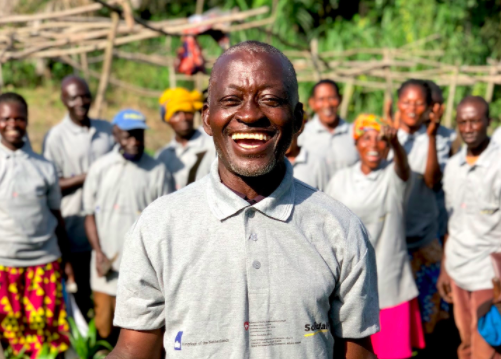
The region continued its support for employees and organizational business, while navigating through the new challenges from the Covid-19 pandemic. Guidelines were instituted for employees to have quick and virtual access to physicians for primary health care, and support employees to continue to work effectively in a virtual environment. Solidaridad West Africa streamlined its employment contracts in response to current programme and operational exigencies.
New partnerships were developed, and existing ones deepened to address strategic issues associated with the value chains we work in and to improve the region’s fundraising efforts. In 2020, Solidaridad West Africa engaged 32 partners. These partners included five government institutions, one civil society organization, 12 private companies, eight funding partners, one research institution, and five financial institutions.
In Côte d’Ivoire, Solidaridad partnered with the National Union of Savings and Credit Cooperatives (Unacoopec-ci) and Sucden to support Village Savings and Loan Associations and cooperatives to access formal financial services, and train cocoa farmers on good agricultural practices and good environmental practices, respectively.
In Sierra Leone, Solidaridad partnered with The Latter-Day Saints Charities to support families to access resources essential to early childhood development for the improvement of child nutrition in 50 farming communities.
To influence policies that support the implementation of climate-smart oil palm production in Nigeria, Solidaridad worked in partnership with the ministries of agriculture of four state governments – Akwa-Ibom, Cross River, Enugu and Kogi State. As a result of this partnership, budget allocations have been made towards the development of the oil palm sector in these states.
Our collaboration with four financial institutions in Ghana have enabled 7,000 smallholder cocoa farmers access credit of over 2,175,000 euros.
The PMEL quality assurance process was updated to outline the needed actions required for effective programme monitoring and evaluation. At the onset of COVID-19, SWA conducted an internal study to understand the effect of the virus on our interventions and staff work schedule. The results, which indicated a reduction in programme resources and 43% of daily total staff time, informed the deployment of the IVR to continue to reach beneficiaries.
Over 400 local implementation partners were trained on the use of our internally designed digital tools for training reporting and the registration of 46,429 beneficiaries into six programmes.
SWA conducted four baseline studies, three midterm evaluations, two end-of-programme evaluations, two annual surveys and one rapid assessment.
The following are some key results from three of the evaluations conducted:
NISCOPS Baseline
Using a mixed methods approach, the baseline sought to provide benchmarks for measuring the performance of three key indicators of the programme. From 1,044 oil palm farmers and millers sampled, an average yield of 6.54t/ha was recorded. Poor management of palm oil mill effluent was a significant contributor to greenhouse gas emissions. The report recommended the production of biogas from mill effluents.
MASO Impact Evaluation
The study evaluated how the Next Generation Youth in Cocoa Programme (MASO) has contributed to improving economic outcomes for its youth participants. Adopting the Propensity Score Matching (PSM) quasi-experimental method, both quantitative and qualitative surveys were conducted. The results showed that the programme had positive impacts on poverty reduction, intensive labour supply and income. As part of its recommendations, the study proposes the need for youth employment programmes to consider gender and age-specific challenges, and address them ahead of and as part of the intervention.
Cocoa Life Annual Survey
This was conducted to assess the progress made by trained beneficiaries. The survey showed that beneficiaries have increased their average yield from 0.40t/ha to 0.64t/ha after applying intensification cocoa production practices. Also, 29% of the beneficiaries are engaged in alternative livelihood activities.
All projects and programmes across the region received adequate communication support to increase programme visibility and alignment to the corporate branding.
The region did not only promote its work on the vibrant regional Facebook page, but also on LinkedIn and Twitter. The more than 10,000 social media followers were engaged with over 400 posts and relevant contents on programme activities and results.
Eleven short videos on programme outcomes, as well as 2,230 branded materials and brochures were produced to support programme and corporate communication.
A newsletter and knowledge product on the Ghana Dedicated Grant Mechanism project were published. Additionally, six knowledge products that catalogue Solidaridad’s approaches, experiences, results and lessons learned while implementing cocoa and oil palm programmes were produced and disseminated.
In all five operational countries, strategic media engagements were harnessed to spotlight Solidaridad’s work in several print and digital media, as well as television and radio outlets. Solidaridad secured 80 speaking slots for senior officers to engage stakeholders on relevant themes within the region and participated in campaigns to promote gender and youth inclusivity in sustainability programmes.
Finance
Although Covid-19 created financial challenges globally, the West Africa office closed the year in a stable financial position, with a strong pipeline of opportunities and existing projects carrying forward into this next strategic period.
